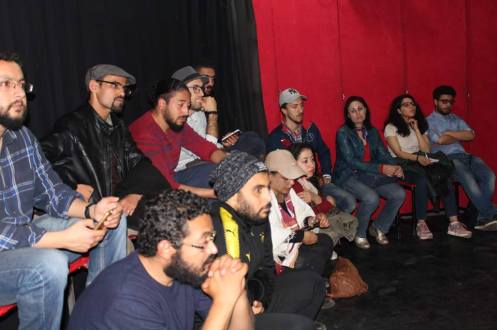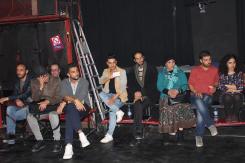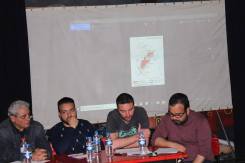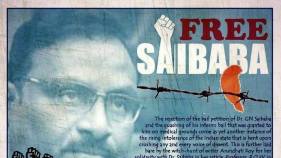in via di traduzione
Tunisia: Meeting supporting political prisoners George Ibrahim Abdallah and prof G.N. Saibaba
Last saturday a meeting organized by Ligue Lutte Jeunes (Youth
League Struggle), a revolutionary tunisian organisation, took place with
the presence of the Tunisian Committee for the Liberation of Georges
Ibrahim Abdallah and the International Comitee Supporting People’s War
in India.
The meeting under the name of “The day of the revolutionary prisoner” was organized as a part of the preparatory works for the national convention of Ligue Lutte Jeunes that will take place the next 15-16-17 of March.
Here the text of the International Comitee Supporting People’s War in India speech:
The meeting under the name of “The day of the revolutionary prisoner” was organized as a part of the preparatory works for the national convention of Ligue Lutte Jeunes that will take place the next 15-16-17 of March.
Here the text of the International Comitee Supporting People’s War in India speech:
The
Indian revolution has its roots in the revolt of the farmers of
Naxalbari in 1967, when for the first time the peasants occupied the
lands of the landowners who were supported by the government and by the
revisionist CPI (Marxist).
From
that moment the revolutionaries within that party rebelled against
their own direction, supported the peasant movement and finally founded a
new party the CPI (m-l).
Despite the formal independence of this great country by the British Empire in 1947
India
is still a semi-colonial and semi-feudal country even if in the big
cities the working class becomes more and more numerous and active. The
PCI (m-1) then decided to continue the New
Democracy revolution through the strategy of the People’s War. organizing the peasants and tribal peoples in the countryside and in the forests, building the embryos of the new power with the aim of encircling the cities from the countryside.
Democracy revolution through the strategy of the People’s War. organizing the peasants and tribal peoples in the countryside and in the forests, building the embryos of the new power with the aim of encircling the cities from the countryside.
After
several splits and subsequent mergers, since 2004 the CPI (m) is
founded managing to unite all the main revolutionary experiences that
over the years had joined the GP.
India
is a huge country, about 1 billion and 200 million people, there are
over 20 official languages and thousands of dialects, so there are
several nationalities oppressed by the central government and tribal
people who are formally citizens of the “biggest democracy” of the world
suffer severe discrimination, are driven from their lands that are
given to multinational companies to exploit the rich national resources
of the country. imperialism has therefore never stopped controlling the
country economically through the local government in the hands of the
comprador bourgeoisie in business with imperialism itself.
Women
are also the subject of serious discrimination and in recent years
there have been serious cases of rapes and killings that are becoming
more numerous.
The CPI (m) then organizes all these sectors of society in the EGPL and FDR in the GP.
Currently
the revolutionary forces control large areas called Compact
Revolutionaries Zones and the bourgeois Red Corridor, to get an idea,
the area in which the revolution develops is in around 15 states out of
29 and in the areas liberated by the PCI (m) in which there is no more
the presence of the old State, there are about 60 million people already
self-governing in an embryonic way: the peasants are owners of the land
that they cultivate, there are schools, hospitals and popular courts.
Popular militias have been established to defend villages from police
attacks. Instead the EGPL, takes care to carry forward the revolutions
through the guerrilla war.
A
few years ago, the Indian Prime Minister described the Maoists as “the
biggest internal security treath” by launching the Green Hunt operation,
a real war against the people. With the use of paramilitary forces, the
government to allow the multinationals to exploit the resources, razed
entire villages, killed and raped, began to use increasingly
sophisticated weapons even with the support of the Zionist entity,
expert in the war against the Palestinian people, with whom various
military and arms sales agreements have been signed.
We
can state that the New Democratic Revolution in India is the biggest
revolution in the world in progress. Directed by the largest
revolutionary party, with a strong guerrilla army of tens of thousands
of fighters and mass organizations (trade unions, women, students, etc.)
with millions of adherents in the countryside and in the cities. The
victory of this revolution would represent a major blow to imperialism
and a great hope for all oppressed peoples and workers all over the
world.
But
since the operation GH has intensified selective killings of
revolutionaries have been carried forward and tried to silence the
democratic movement in the big cities that denounces the genocidal
operation of the government.
This
is why the International Committee for Supporting the Popular Indian
War was founded with national committees in different countries: Italy,
France, the Spanish State, Germany, Austria, Holland, Ireland, England,
Finland, Norway, Sweden, Serbia, Brazil, Chile, Ecuador , Mexico, USA,
Canada, Sri Lanka and Tunisia.
The
aim of the committees is to denounce internationally the fascist and
repressive nature of the Indian government and the GH operation, to
denounce that India is not at all the “greatest democracy in the world”
but the largest prison of peoples as the comrades say.
Secondly,
the committee supports the strategy of the People’s War in India: in
all the countries there can be no real change in the living conditions
of the popular masses without the conquest of political power and this
can happen through the conscious organization of the “armed sea of the
masses “against any pious electoral and pacifist illusion. In other
words it is necessary to build the necessary tools:
a
revolutionary party, a united front of the oppressed social classes,
and a popular armed force to face the equally organized enemy. It is a
contradiction to speak of “democracy” when there is a police state that
accuses terrorists of rebelling for their rights, which arrests
sincerely democratic activists because they criticize the government and
allow religious extremists to organize themselves, against all this.
The answer is the New Democratic Revolution carried out with the
strategy of the People’s War.
The
individual national committees conduct different and varied activities
according to specific national conditions and their composition. They
range from assemblies like these, to demonstrations in front of the
Indian embassies (as we do here for George Ibrahim Abdallah) to
solidarity petitions signed by workers and students, to writings on the
walls, to large demonstrations of peasants as happened in Brazil.
Similar activities have also been done here in Tunisia, the Jemna
peasant movement by the mouth of Taher Tahri has already expressed
solidarity and even Ridha Barkati has done the same by recently renewing
his support for the Indian revolution.
In
the coming months, the Committee will conduct an international campaign
for the release of all Indian political prisoners (about 10 million)
and in particular three symbolic prisoners: Saibaba, Ajith and Kobadh
Ghandi.
Saibaba’s
case is very emblematic: he is an english university professor in the
University of New Delhi. As a prof. He organized several meetings
criticizing the atrocities of the Operation Green Hunt inside and
outside the university. For this reason he was arrested with the charge
of terrorism and he was already sentenced to life prison! You must know
that Prof. G;N; Saibaba is 90% disabled and he is on a weelchair.
Among
these political prisoners there are also many metal workers who went on
strike and were accused by the government of belonging to the PCI (M)
and also many students who denounced Operation Green Hunt as a genocide
proving that it is not at an “anti-terrorist struggle”.
The
campaign will take the name of “Spring Thunder” and will take place in
the above-mentioned countries during the months of April and May with
various activities and, where possible, events will be organized under
the Indian embassies to demand the immediate release of Indian political
prisoners. We hope that this assembly can lay the foundations for
strengthening this important international campaign also in Tunisia.






Nessun commento:
Posta un commento